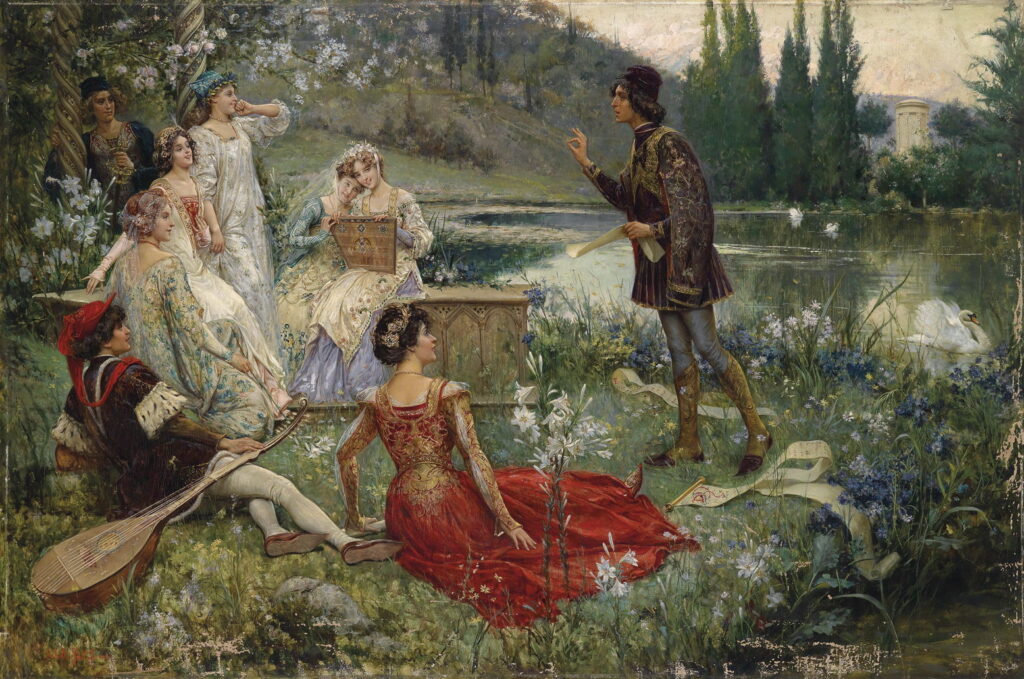The Decameron is a series of stories written by Giovanni Boccaccio. These stories are told by three men and seven women in the year 1348, during the rise of the Black Plague. In these texts, there are many mentions of themes, morals, and lessons learned throughout. One of the many themes that often came up in his writing is generosity. This theme is greatly shown throughout Day 10, Novel 3 and Day 1, Novel 1.
In Day 10, Novel 3, which is narrated by Filostrato. In this story, Nathan, a wealthy and generous man, has a palace built so he can provide help and places to stay for any travelers that may need assistance on the way. He is met with Mithridanes, a man who is jealous of Nathan’s very giving nature, and is set to be more generous than Nathan, as he sees it as a competition. He creates a plan to kill Nathan, and ends up meeting Nathan himself without realizing. Once Mithridanes realizes the faults in his plan to kill Nathan after meeting him, he instantly backs down. Nathans suggests switching bodies with Mithridanes, as he still believed in giving Mithridanes what he needed. Ultimately, this gives Nathan a stronger sense of accomplishment with his generosity. Day 10, Novel 3 states, “Nathan for some days honourably entreated Mithridanes; Mithridanes, being minded to return home with his company, took his leave of Nathan ”. Nathan fulfills his promise, always giving people what they want and need, and Mithridanes becomes the person who is known for giving, additionally learning how to be generous.
Another example of generosity is in Day 1, Novel 1, as told by Panfilo. In this story the main character, Master Ciappelletto, is known as the towns’ ‘fool’. He goes against many rules, he creates fake documents and testimonies, never goes to church, and often uses profanities. Due to this, many people were not fond of him, his actions or personality. He ended up moving to continue his practice, but became ill when staying at the house of two Florentine lenders. This became an issue for them, as if Master Ciappelletto did die, no one would bury him, but instead leave them with the body. Ciappelletto, however, was listening in on this conversation between the two lenders, and came up with a plan: meeting a friar to give his confessions before he died. The friar goes to see Ciappelletto, but ends up getting tricked, as Ciappelletto he ends up lying about his confessions and creating lies. The friar ended up believing him, and Ciappelletto died that same day. Since he lied to the friar, he ended up getting buried at the friar’s convent, as he believed Ciappelletto was holy enough. Day 1 Story in the Decameron states, “The holy man was mightily delighted with these words, which seemed to him to betoken a soul in a state of grace”. At the end of this story, the narrator explains how this is an example of generosity on friar’s end, as he still gave Ciappelletto his rights, despite the opinion of others. He states that this story was a mix of good and evil in the main character, Master Ciappelletto, that had “an end with generosity glorified for its own sake and for God” (The Frame Characters of the Decameron: A Progression of Virtues).
Annotations:
Decameron web. Decameron Web | Texts. (n.d.). Retrieved November 14, 2021, from https://www.brown.edu/Departments/Italian_Studies/dweb/texts/DecShowText.php?myID=nov0101&lang=eng.
Decameron web. Decameron Web | Texts. (n.d.). Retrieved November 14, 2021, from https://www.brown.edu/Departments/Italian_Studies/dweb/texts/DecShowText.php?myID=nov1003&lang=eng.
Joan M. Ferrante, The Frame Characters of the “Decameron”: A Progression of Virtues (n.d.). Retrieved November 14, 2021, from https://www-jstor-org.ccny-proxy1.libr.ccny.cuny.edu/stable/44940122?seq=14#metadata_info_tab_contents.



